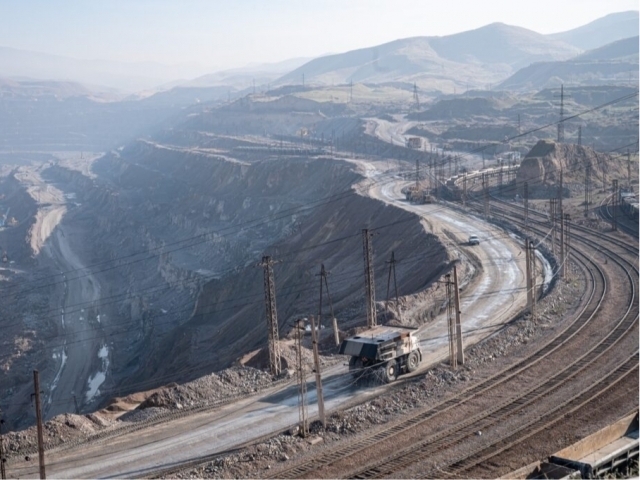Uzbekistan may face a “resource curse” – study
Local
−
26 March 2025 32060 6 minutes
Uzbekistan has the potential to become a leader in the global market for strategic minerals, but the rapid development of the mining industry could pose serious environmental and governance risks. This is according to a study by Nodir Ruzmatov, founder of One Nexus Group in California.
The study notes that expanding the volume of extraction can attract investment and stimulate economic growth, but mismanagement is likely to lead to severe environmental consequences, as was observed during the Aral Sea crisis. The country must introduce strict environmental standards to prevent water pollution and inefficient resource use, invest in sustainable mining technologies, and strengthen regional cooperation. It is not as important whether or not to develop this sector, but how to manage it responsibly. To ensure long-term prosperity, Uzbekistan must prevent irreversible environmental damage.
“Uzbekistan is at a crossroads. Global demand for strategic minerals, essential for clean energy and high-tech manufacturing, is growing at an unprecedented rate. Rich in gold, copper, lithium, and rare earth elements, Uzbekistan has the potential to become a global supplier. But as history shows, such wealth can be a double-edged sword,” the researcher writes.
In his view, the transition to electric vehicles, renewable energy, and digital technologies has created an insatiable demand for strategic minerals. As one of the world’s top 10 gold producers and copper exporters by 2024, Uzbekistan has the opportunity to tap into untapped reserves of strategic minerals and rare earth elements. If managed wisely, this sector could attract billions in investment, create new jobs, and enhance Uzbekistan’s position in the global economy.
“But the risks are just as great. Resource-rich countries often suffer from what is known as the ‘resource curse’ – an economic boom followed by environmental degradation, corruption, and instability. Uzbekistan is no exception. Transboundary water issues are already a serious concern, with industrial waste from neighboring Kazakhstan polluting the Syr Darya River. Heavy metals, arsenic, and other toxic substances threaten agriculture, food security, and public health. Expanding the mining industry without strict environmental safeguards could turn this golden opportunity into an environmental disaster,” the study warns.
Uzbekistan’s ambitions to develop its mining industry also face a classic environmental challenge – the ‘tragedy of the commons’. If vested interests prioritize short-term profits over long-term sustainability, shared resources like water and air could suffer irreparable damage. The Syr Darya crisis serves as a clear example.
“There have been many such conflicts in history. In the Colorado River dispute between the United States and Mexico, uncontrolled water use upstream led to a shortage of drinking water downstream. As a result, the two countries reached firm agreements to ensure water sharing and sustainable management.
Similarly, China’s dams upstream have dramatically reduced the water level of the Mekong River, affecting agriculture in Southeast Asia. Therefore, better water management has been achieved through regional cooperation. Uzbekistan can also learn from such approaches and implement adaptive strategies,” the researcher says.
He adds that one of Central Asia’s most notorious environmental disasters, the Aral Sea crisis, serves as a stark warning about the consequences of industrial mismanagement. Once the world’s fourth-largest lake, the Aral Sea has now shrunk to just 10 percent of its original size, largely due to overuse of water for cotton production. This environmental catastrophe crippled local economies, destroyed biodiversity, and created toxic dust storms that continue to pose health risks. Since the Aral Sea disaster resulted from unsustainable resource use and mismanagement, Uzbekistan must learn from this event as it expands its strategic mineral industry.
“Uzbekistan’s future in the strategic minerals market will depend not only on its natural resources but also on the policies governing their management. To prevent environmental catastrophe and ensure long-term economic success, the government must take decisive action in several key areas,” says Nodir Ruzmatov.
He writes that Uzbekistan should conclude binding agreements with Kazakhstan to regulate industrial waste discharges and prevent further pollution of shared water resources. Diplomatic negotiations should be supported by real-time water monitoring technologies to ensure transparency and accountability in environmental management.
According to the researcher, mining projects should also be conducted based on strict environmental standards. Companies should only be granted operating licenses after a thorough environmental impact assessment. Enterprises that violate sustainable development criteria should face financial penalties – Uzbekistan should prioritize environmental health over economic interests. The country also needs to invest in modern, water-efficient technologies to prevent waste from the mining industry. Countries such as Canada and Australia have already adopted clean mining methods, including water recycling systems, dry waste collection, and advanced filtration technologies.
Additionally, Nodir Ruzmatov stresses that regional cooperation must become a priority. Water conflicts in Central Asia are nothing new, but Uzbekistan has the potential to be a leader in the transition to sustainable management. Cooperation with organizations such as the Interstate Commission for Water Resources Coordination should be strengthened to ensure equitable distribution of water resources and environmental protection.
“Uzbekistan needs to invest in research and training. If the country is to avoid becoming merely a raw material exporter, it must gain expertise in sustainable mining practices. Collaboration with universities, technology companies, and industry leaders can help local experts implement responsible mining technologies.
Finally, public participation must be a priority. Public hearings and discussions should become standard practice before major mining projects are approved. Civil society groups and environmental organizations must be actively involved in shaping the policies that will determine Uzbekistan’s future,” he adds.
The question now is not whether Uzbekistan will develop its strategic minerals sector, but how. The Syr Darya crisis and the Aral Sea disaster are warning signs. If Uzbekistan does not address its water pollution problems now, the consequences could be irreversible,” the researcher concludes.
The study suggests that with smart policies and sustainable development, Uzbekistan can lead Central Asia through a responsible mining industry and become a global supplier of minerals essential for a clean energy future.
Live
All




